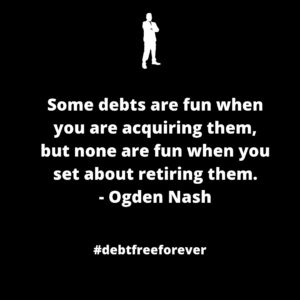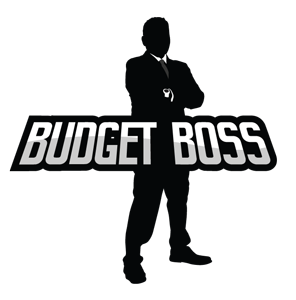Wednesday, September 12, 2018
When NOT to Pay Down Debt As Soon As Possible
If you know me at all or have read any of my posts in the past, you know that I absolutely despise debt. I think all debt is bad with very few exceptions. I believe that the plague of debt is ruining the middle class of our society and is what’s causing the turbulent political times we currently live in, along with several other factors. That being said, I do believe there are some instances where paying off debt may not be your top priority. They are very few as well, but there are legitimate reasons for them. Today, I will describe the situations that exist where paying off debt may not be your top priority. Please read and understand my rationale as it is important to know the gravity of my beliefs on debt.
1) If there is a penalty for paying down the debt
Some loans, shitty loans, charge you a penalty for paying them down early. In some cases, the penalty for paying them down early is the same as or greater than the interest accrued while paying off the loan in a normal fashion. In these situations, it would be prudent to not accelerate the debt repayment plan and instead save and invest the difference. You can then pay off the loan in full when the penalty is lower or negligible. In the future, try your best to avoid loans that have a penalty for early repayment. These are essentially money grabs by greedy institutions who want their profit no matter the cost. This means you should know all the terms up front. The is especially true when it comes to your mortgage. You wouldn’t believe how many times I have seen people who have no clue the terms and conditions of the largest purchase of their lives. Don’t be like that.
2) If you have no savings whatsoever
Aggressively paying off debt is very, very, very important. If you have no savings, however, paying off the debt takes a back seat. The reason is simple: There is no point in paying off debt quickly if any little bump in the road can take you off track. This is why Baby Step #1 of Dave Ramsey’s famous “Seven Baby Steps to Financial Freedom” is to save a mini-emergency fund of $1000. As you probably know, little speedbumps will come and throw you off track while paying off debt. In all reality, it was probably those little speed bumps, along with bad spending habits, that got you into debt in the first place. When you get into full debt repayment mode you don’t want anything holding back your progress. Saving an emergency fund, even a small one, is part of the debt repayment process.
The Real Reasons for a Rainy-Day Fund – Budget Boss
3) If you are interest-free
While most interest-free loans are a trap to get you to buy, they are still interest-free. I will start this portion by saying that even if a loan is interest-free, you should not neglect it. However, it may not take priority over other expenses. Here is an example:
- Dave has an interest free loan for an automobile (15K)
- He can comfortably pay his monthly payment of $250
- Dave also commits 15% of earnings into retirement savings
- Dave should also commit some money towards slush savings, including the next purchase of a car
I fully admit there are some instances when a loan must be taken out. If you need a car for work, have no savings, and work will allow you to acquire savings, then the choice is clear. The key is to use that situation as a stepping stone towards not having to do it again. Emergency slush savings is vital to all our lives. We will all need to replace costly items like a car, furnace, roof, etc., during our lifetimes. Find the best rate possible, such as interest-free, and make sure the ship is still afloat.

4) If you need to invest
While debt is terrible in my mind, not saving and investing is as well. I believe that paying off debt and saving money is all about mentality. It is the mental strength you have that will propel you through the grind of both. Having some savings invested for the future is the glimmer of hope some need to power them through the debt repayment grind. I personally see nothing at all wrong with saving a small portion of your pay every month while aggressively paying off debt. Here is my reasoning behind that. Paying off all your debt is a gratifying experience, but it is also kind if empty. I remember a feeling of “Well, now what,” the day I became debt free. Saving a small amount while paying off debts in either an emergency fund or investment account can be the light at the end of the tunnel that you need to make it through the tough times. When you are done paying off the debt you can then just top up the savings contributions and keep on rolling. While I will take $0 over -$20,000 any day of the week, it is still $0. Having a small investment plan to go along with zero debt is a nice feeling. It also helps you take advantage of the time needed for the effects of compound interest. Just a disclaimer, this does not include high-interest consumer debt. That kind of debt should always be paid off as soon as possible with all your might.
These 3 Charts Show The Amazing Power Of Compound Interest – Business Insider
5) If the budget or situation dictates
Not paying off debt has consequences. Sometimes those consequences can be mitigated by your budget or life circumstances. For instance, I used my business line of credit to get some well-needed website work done. I could have very easily used my savings to do this work, but the savings I had were for a different purpose. Those savings were for an upcoming business opportunity. I did not know fully when this opportunity would emerge, so I decided to use the line of credit and keep my savings intact. I then chose to pay down the debt over the next few months. Sure enough, while paying down the debt, the business opportunity arose, and I took advantage of it. The total cost of servicing the line of credit was not much, albeit any interest paid is bad. I weighed the options and felt as if it was in my best interest to make the move I did. The point is that if you decide to not pay down debt quickly, you better have a damn good reason and most importantly, the budget must be comfortable. This is why the budget is so very important. Based on it you can make wise decisions about your expenses moving forward. Without the budget, you have no blueprint for what expenses you can comfortably take on. Ideally, you would take on no debt ever, but again, the situation and budget should dictate. The key is to think long and hard about these decisions and have a plan moving forward.
While I realize not paying off debt is conflicting my message of having no debt ever, I don’t come to these conclusions lightly. You must be thoughtful, precise and most importantly, the numbers must make sense. Not taking your time and due diligence can and will lead you to make a bad decision which will hurt your finances moving forward.
“Some debts are fun when you are acquiring them, but none are fun when you set about retiring them.” – Ogden Nash

Email – joe@budgetboss.ca
Follow Budget Boss on – Facebook LinkedIn Twitter Instagram Pinterest Quora

